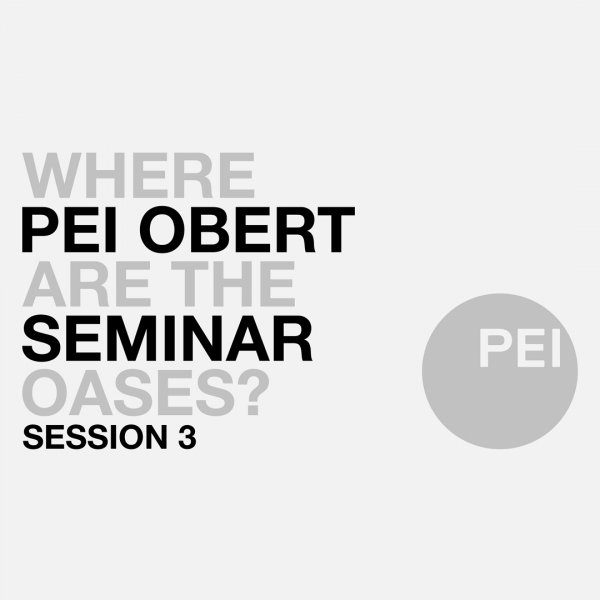Kader Attia, Sarah Nuttall and Françoise Vergès Where are the Oases? PEI OBERT seminar
Kader Attia will delve into the concept of collective individuation. Sara Nuttall will explore the sensory and political agency of water in the literary archives of southern Africa. And Françoise Vergès will invite us to follow a speculative fiction to the future and look back on how we have faced that which is irreparable and moved forward in imagining new ways of inhabiting the planet.
Taking the question Where are the Oases? as the starting point for this ninth edition of PEI, the seminar aims to explore diverse configurations of emancipatory space-times, intersections of decolonial practice and thought.
The Independent Studies Programme (PEI) is a learning tool that aims to share and disseminate part of its content via the PEI Obert programme and the La Colonie nomade project, as well as through the occasional offer of places in certain academic courses.

Programme
Kader Attia, Vers une individuation collective (Towards a Collective Individuation)
The fragmentation of the human subject is becoming more normalised each day, now that we have entered an information-saturated society in which colonisation has spread to new territories as well as new behavioural and mental spaces. The aim of this session is to think about how the reappropriation of the subject constitutes the main goal in the reparation of the ontological disappearance of individuation. Through individuation, a subject is no longer a noun but a verb, moving closer to other individuals via their thoughts and actions to together form a collective individual. This is what philosophers such as Antoinette Rouvroy and Bernard Stiegler call collective individuation. Through political debates, works of art or poetic actions, collective individuation allows us to “reappropriate” space and time as a place for encounter and physical and intellectual respite, for intelligent and productive consumption, for preservation as opposed to wastefulness. In short, for the creation of oases of thought unassociated with the zombie individualisation that algorithm-based governmentalisation offers each contemporary individual.Sarah Nuttall, Earth Infrastructures
The presentation will explore the idea of the biospheric capacities of the Earth’s infrastructures based on the publication Reading for Water, edited in collaboration with Isabel Hofmeyr and Charne Lavery. This research project strives for a method that follows the sensory, political, and agency power of water through the literary archives of southern Africa. It follows rivers, rainfall, streams, tunnels and sewers, connects atmospheric, surface and groundwater, and describes competing hydrological traditions, hydro-infrastructures and hydro-epistemologies. These Earth infrastructures are connected to the most ancient records of engineering, architecture and urban planning, although they are different from them. We will see how the reading of water moves laterally, vertically and in counterpoint between different water worlds and hydro-imaginaries. In doing so, it illuminates the space as something proprioceptive, volumetric and environmental. It intersects with an emerging range of approaches including critical ocean studies, new materialisms, coastal and hydro-critical perspectives, as well as atmospheric methods, centred on southern African sources from which it draws new genealogies and thought configurations.
Françoise Vergès, Histoire orale d’une oasis de 2070 (Oral History of an Oasis in 2070)
This is an exercise in speculative fiction. Based on current issues, questions and problems–fascist politics, anti-Blackness, the permanent state of war, militarism, climate catastrophe, colonial occupation, authoritarian capitalism, anti-refugee policies– Françoise Vergès will imagine a conversation in which two people in 2070 look back at 2023, discussing what has emerged from the collapse of racial capitalism and describing the oasis where they live. Even though racial capitalism and imperialism have not been totally crushed, here and there people have imagined new forms of social organisation, of inhabiting the planet and of dealing with the irreparable.- The activity is held in the MACBA Meier Auditorium in English.
- You can also follow it live on the museum’s website and YouTube channel.
Registration for individual sessions can only be done at the museum, before the start of the activity, and is subject to the availability of spaces.
If you have any question, feel free to contact us on 93 481 79 05 or by email at pei [at] macba [dot] cat.


